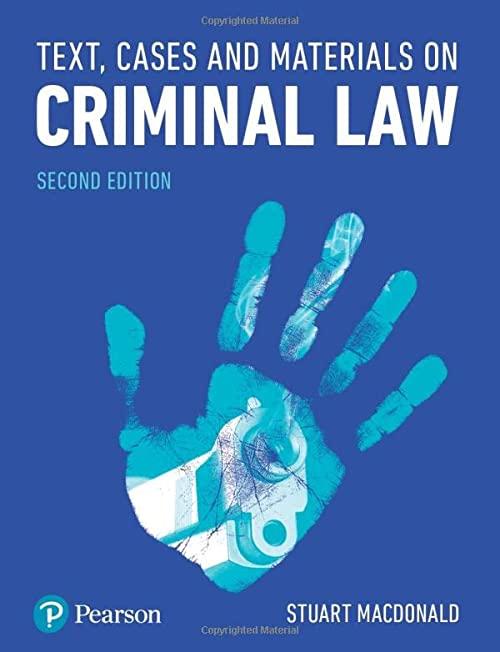Question
Read the You Be the Judge on p. 206 of the text. It is the case of Kim v. Son. Review the facts, and the
Read the "You Be the Judge" on p. 206 of the text. It is the case of Kim v. Son.
Review the facts, and the arguments of each party in the case.
The issue in the case is:was there valid consideration exchanged between Kim and Son to make an enforceable contract?
Read section 11-1 on Consideration before answering.
1. What are the requirements for consideration?
2. Are the requirements met in the case? Why or why not? (Point to the facts that do or do not support your position.)
As the judge, decide for one party or the other. State your reasoning. Try to go beyond reiterating the argument given in the text. Also, don't rely on your instinct. Apply the law.
(This is straight from the textbook)
Facts: Stephen Son was a part-owner and operator of two corporations. Because the businesses were corporations, Son was not personally liable for the debts of either one. Jinsoo Kim invested a total of about $170,000 in the companies. Eventually, both of them failed, and Kim lost his investment. Son felt guilty over Kim's losses. Later, Son and Kim met in a sushi restaurant and drank heroic quantities of alcohol. At one point, Son pricked his finger with a safety pin and wrote the following in his own blood: "Sir, please forgive me. Because of my deeds, you have suffered financially. I will repay you to the best of my ability." In return, Kim agreed not to sue him for the money owed. Son later refused to honor the bloody document and pay Kim the money. Kim filed suit to enforce their contract. The judge determined that the promise did not make a contract because there had been no consideration. You Be the Judge: Was there consideration? Argument for Kim: As a part of the deal, Kim agreed not to sue Son. What could be more of a forbearance than that? Kim had a right to sue at any time, and he gave the right up. Even if Kim was unlikely to win, Son would still prefer not to be sued. Besides, the fact that Son signed the agreement in blood indicates how seriously he took the obligation to repay his loyal investor. At a minimum, Son eased his guilty conscience by making the agreement, and surely that is worth something. Argument for Son: Who among you has not at one point or another become intoxicated, experienced emotions more powerful than usual, and regretted them the next morning? Whether calling an ex and professing endless love or signing an agreement in your own blood, it is all the same. A promise not to file a meritless lawsuit has no value at all. It did not matter to Son whether or not Kim filed suit because Kim could not possibly win. If this promise counts as value, then the concept of consideration is meaningless because anyone can promise not to sue any time. Son had no obligation to pay Kim. And the bloody napkin does not change that fact because it was made without consider-ation of any kind. It is an ordinary promise, not a contract that creates any legal obligation.
Answer the questions from above
Step by Step Solution
There are 3 Steps involved in it
Step: 1

Get Instant Access to Expert-Tailored Solutions
See step-by-step solutions with expert insights and AI powered tools for academic success
Step: 2

Step: 3

Ace Your Homework with AI
Get the answers you need in no time with our AI-driven, step-by-step assistance
Get Started


